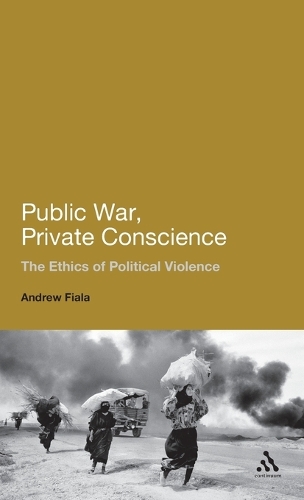
Public War, Private Conscience: The Ethics of Political Violence
(Hardback)
Available Formats
Publishing Details
Public War, Private Conscience: The Ethics of Political Violence
By (Author) Andrew Fiala
Continuum Publishing Corporation
Continuum Publishing Corporation
2nd May 2010
United States
Classifications
Professional and Scholarly
Non Fiction
Social and political philosophy
Ethics and moral philosophy
172.42
Physical Properties
Hardback
200
Width 138mm, Height 216mm
Description
Public War, Private Conscience offers a philosophical reflection on the moral demands made upon us by war, providing a clear and accessible overview of the different ways of thinking about war. Engaging both with contemporary examples and historical ideas about war, the book offers unique analysis of issues relating to terrorism, conscience objection, just war theory and pacifism. Andrew Fiala examines the conflict between utilitarian and deontological points of view. On the one hand, wars are part of the project of public welfare, subject to utilitarian evaluation. On the other hand, war is also subject to deontological judgment that takes seriously the importance of private conscience and human rights. This book argues that the conflict between these divergent approaches is unavoidable. We are continually caught in the tragic conflict between these two values: public happiness and private morality. And it is in war that we find the conflict at its most obvious and most disturbing.
Reviews
"Fiala explores the relation between the public and the private, the state and the individual, and war and peace with philosophical rigor and clarity. His writing is superb, and the views he defends demand to be taken seriously. This is an urgent and important contribution to our on-going attempts to understand the human conditiona condition marked as much by violence and atrocity as it is by acts of kindness and generosity." - J. Jeremy Wisnewski, Hartwick College, USA
"The Enlightenment philosopher, Immanuel Kant, complained that the doctrine of justifiable war' provides little more than comfort to war-mongers. In this eloquent new essay, Andrew Fiala explores the dimensions of comfort' that our own Kantian convictions regarding the moral superiority of democracy and human rights provide when coupled with a grinding utilitarian logic' justifying the public use of deadly force in their furtherance. Surveying philosophical reflections on war from Plato, Kant, Bentham and Hegel to Hanna Arendt, John Rawls, and Michael Walzer, Fiala issues his own provocative challenges to our perpetual justification of our war-making and war-fighting, and examines, from Hiroshima to Baghdad, the private tragedy that war, as the sublime dance of cosmos and chaos', invariably reveals itself to be." - George R. Lucas, Jr., Class of 1984 Distinguished Chair of Ethics, U.S. Naval Academy, Professor of Philosophy and Public Policy, Naval Postgraduate School, USA
'This very readable work gives a valuable overview of philosophical attempts over the centuries to analyse war and how the state's logic of war is at odds with the moral logic of the individual' - Morning Star
There is much to admire here, and Fiala's historical analysis of philosophical thinking about war is nuanced and interesting. -- Political Studies Review Vol. 10
Author Bio
Andrew Fiala is Professor of Philosophy at California State University, Fresno, USA. He is the author of The Just War Myth (Rowman and Littlefield, 2008), The Philosopher's Voice (SUNY Press, 2002) and Practical Pacifism (Algora Press, 2004).
